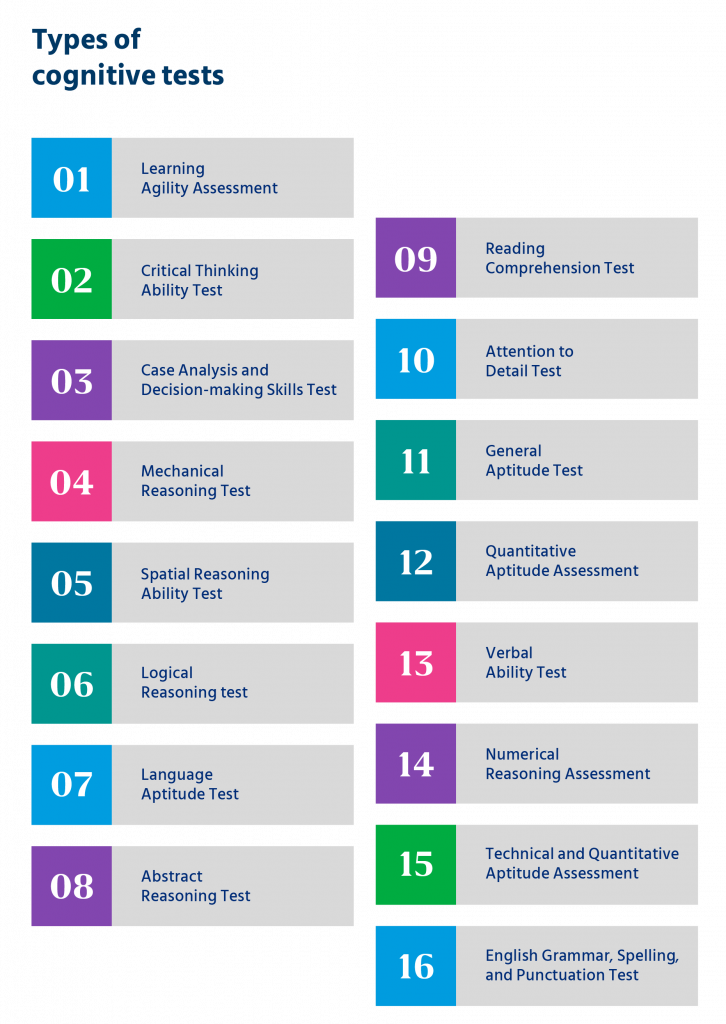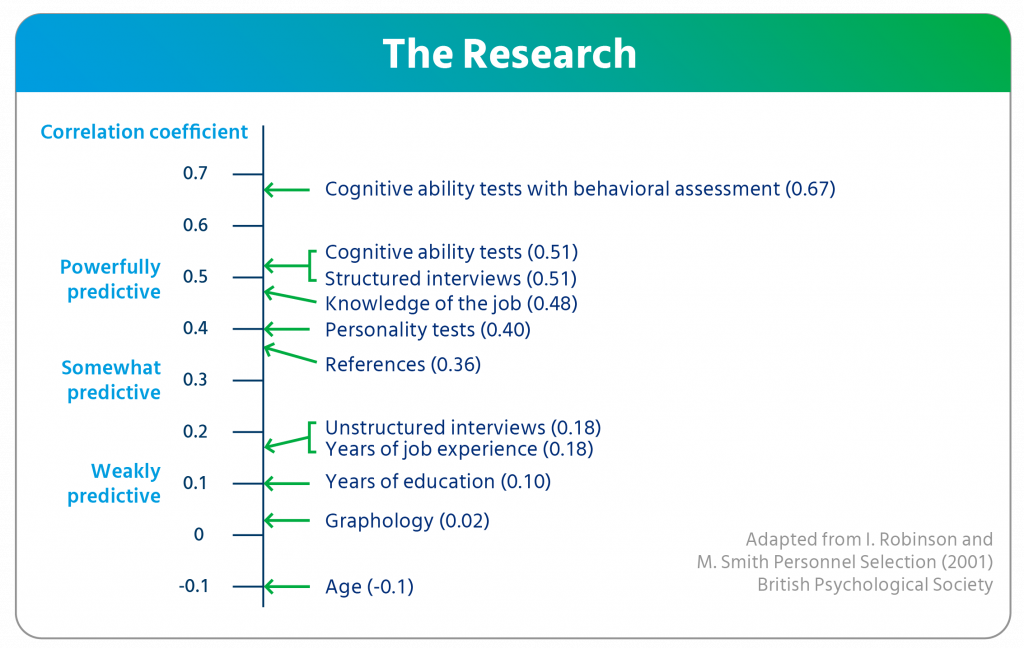Conducting a holistic cognitive evaluation won’t be an easy task if not for a cognitive assessment test. The cognitive test checks for the essential competencies required to perform any job efficiently. Such a test can assess a person’s mental construct in terms of their ability to think quickly, solve ambiguous problems, and devise new concepts when presented with novel information. So, here’s a rundown of the different types of cognitive tests that assess candidates on various cognitive aspects and are commonly used in the recruitment process:

Learning agility represents a candidate’s ability and willingness to learn from past experiences, adapt to a new situation, and efficiently perform in new work conditions. Undoubtedly, self-learners, high potential employees are agile learners. Therefore, they are fit for assuming leadership positions, for they actively respond to unfamiliar situations and get the most out of experiential learning. Learning agility assessment is designed to get hold of such individuals who are agile learners and are also best suited for leadership positions in any organization.
It’s Useful In:
- Creating a talent pool to identify high potentials (including emerging stars, early-career employees), making succession plans, strategizing key assignments, and also supporting their learning and development
- Making better-recruiting decisions for roles that require learning agility
- Recognizing existing employees who are likely to perform well in international assignments
- Taking team building exercises up a notch
The critical thinking ability test measures the decision-making capability of a candidate. The assessment evaluates whether a person can identify and address the problem, collate data to question assumptions, provide valid explanations to the problem, and offer the best solution. Such tests work wonders for hiring at mid and senior managerial levels. These cognitive tests help recruiters identify and hire candidates who can recognize problems and solve them efficiently by critically analyzing the given information to identify assumptions, draw inferences and evaluate arguments.
It’s Useful in the Selection of:
- Senior Management candidates
- Mid-Management candidates
- Business Consultants
- Critical decision-makers and strategists
This test is primarily used as a screening tool to select management graduates from the vast talent pool. Such tests are available as case study simulators to get an accurate idea of a candidate’s analytical approach and problem-solving skills. The test analyzes and grades candidates on their answers, thus generating their performance reports. The report is readily available for reference in successive interview rounds, allowing further discussion and analysis with the candidate. The test includes a case study question which the candidate needs to solve and finish in time.
As the name suggests, the mechanical reasoning test measures the person’s ability to solve complex problems based on the knowledge, comprehension, and application of mechanical concepts. The assessment evaluates a candidate’s command of fundamental physical laws and mechanical operations, along with a knack for learning automated processes that include understanding mechanical set-ups and more.
Such an assessment can offer questions of varying difficulty levels in the English language. The questions are interactively structured to map a candidate’s ability to solve engineering tasks, decode technical drawings, and understand technical devices with their functions. The test helps measure a candidate’s inclination to interpret and apply mechanical principles for various engineering and technical job roles.
It’s Useful In:
Hiring candidates with past work experience, preferably in aircraft mechanics, maintenance and repair, automotive, etc.
Spatial reasoning test is a form of cognitive test that evaluates a candidate’s ability to understand and establish spatial relations among objects. This test assesses a person’s ability to visualize and manipulate complex shapes, patterns, or designs in a two-dimensional or three-dimensional plane. Most importantly, identifying the best of the lot through spatial reasoning can reduce downtime in the hiring process. The candidates who have fared remarkably well in the test are believed to be intelligent analysts and natural problem solvers in conceptual skills-based jobs.
Such tests measure a candidate’s propensity to visualize patterns and shapes in complex puzzles and produce the desired results. The test includes questions based on rotating shapes, matching shapes, merging shapes, viewing cubes in 3D, and manipulating other types of solid forms in 2-D and 3-D.
It’s Useful In:
Assessing candidates for screening and placement in sectors that require exposure in specific areas- design, architecture, publishing, illustration, and technology. The test is helpful in the careful selection of candidates for technical and craft-centric jobs. If you consider hiring a candidate with 0-2 years of work experience, this test will come in handy.
This logical reasoning test tests a person’s ability to analyze any given data from multiple viewpoints by breaking it down into simple components, structuring the information logically, and analyzing the relationship between different data points to arrive at a solution. This cognitive assessment test checks for a candidate’s ability to analyze the clarity of thoughts while skipping irrelevant aspects in the process. Those candidates with strong reasoning skills are good at arriving at the right conclusion. They use a steady and consistent approach to solve problems and structure problems and situations accordingly. These assessments identify such talented individuals through a set of questions that challenge their logical reasoning skills.
It’s Useful In:
Hiring fresher candidates across all education levels for various job roles from team lead and managerial positions to executive-level functions. If you consider hiring a candidate with 0-2 years of work experience, this test will suit your needs.
This cognitive test helps identify if candidates have the aptitude to earn foreign languages. The language aptitude test aims to evaluate candidates on linguistic aspects of learning. The test measures the person’s ability to acquire communication skills, mainly speaking and listening skills. It gives an accurate idea about the skillsets of the candidate taking the test, especially in such areas as number learning, linking speech sounds and phonetic symbols together, word formation, spelling, and vocabulary.
It’s Useful For:
- Organizations providing foreign language services, for example, translation services
- Education and training institutes measuring candidate’s aptitude for acquiring new languages
- BPOs and KPOs vying to hire the best individuals who can communicate with clients in foreign countries
The test measures a candidate’s lateral thinking abilities that help define logical rules, trends, and patterns to present the right solution for solving problems. Those candidates who possess strong abstract reasoning skills can solve complex problems creatively. They can apply learnings to solve novel problems by connecting different information points to grasp the bigger picture, detecting patterns and relationships, and solving complex problems by coming up with innovative solutions. Such tests can effectively test candidates’ aptitude to solve problems through logic and creative thinking.
It’s Useful In:
Hiring candidates worldwide for various job roles across the industries, mainly suited for entry-level or senior-most positions. The test works wonders for assessing people for sales and marketing roles, creative designing, writing, and analytics, among others.
The test evaluates candidates’ ability to read, process, retain and synthesize a large amount of written information and quickly comprehend large pieces of written texts.
Candidates that perform exceedingly well in these tests are likely to absorb information faster, interpret it more correctly, and implement them in making rational business decisions than others. The test consists of questions including a passage meant to be comprehended by the candidate and after which the candidate would have to answer questions related to the passage. The format of questions can either be direct or inferential.
It’s Useful In:
Hiring fresher candidates with work experience of 0-1 year for various job roles across industries.
Attention to detail test is beneficial for finding employees who can demonstrate thoroughness and accuracy in accomplishing a task and capturing every minute detail, anywhere, at any point of time, ensuring quality and timelines for completing work. Such highly focused individuals can achieve quality-focused results faster and better than others because they do not need to be continually micromanaged. This test will help organizations filter out the best candidates that provide high-quality, detail-oriented, and on-time results. In addition, recruiters can use this test to hire for entry-level administrative and clerical jobs. This speed-based test measures candidates on various comparison-based questions based on numbers, texts, images, and visuals.
It’s useful for organizations seeking an effective screening and recruitment of entry-level professionals for various roles across industries. It is, however, most suitable for data processing and administrative tasks
General Aptitude Test
Organizations need candidates who can solve complex problems through logical thinking. This test helps companies assess individuals for finding people with the innate or acquired ability to learn new things and apply logic to solve complex problems. The general aptitude test evaluates candidates on core skills and competencies, which are essential to perform well on the delegated tasks. This aptitude test measures the person’s tendency to perform well across various functions. Moreover, these tests help managers in identifying skill gaps and training needs.
The test is thoughtfully designed to assess candidates for various skills with a wide variety of questions. It measures the individual’s information-processing ability, besides evaluating their problem-solving skills at work. Finding potential hires through these tests can significantly improve organizational productivity. An effective employee knows what is expected of them. Using the test, employers can zero in on such responsible employees.
It’s Useful in the Hiring For:
- Administrative and Clerical Roles
- Executive Roles
- Functional and Supervisory Roles
- Senior Managerial and Business Head Roles
- Leadership and Strategic Roles
Quantitative aptitude assessment measures whether a candidate is good at perceiving and processing numbers and related functions to perform basic arithmetic operations while maintaining accuracy and speed in doing calculations. This test accurately measures the aptitude for numerical analysis. It evaluates a candidate’s skills in performing numerical operations, which apply to candidates across job roles, regardless of their educational experience.
It’s Useful In:
The screening and hiring of candidates with 0-2 years of work experience. The test is best suited for candidates with an educational background in engineering, a bachelor’s or master’s in business administration, certification courses in statistics, etc.
Candidates with strong verbal abilities can express their ideas and thoughts using correct sentence structure, proper words, and grammar. Such candidates can put themselves across very well and understand messages in business contexts. The verbal aptitude test helps hire candidates with a good command of English and the ability to understand, comprehend, and convey written messages precisely and clearly by formulating grammatically correct sentences.
It’s Useful In:
Finding candidates for different job roles across industries with 0-1 years of work experience
Candidates with strong numerical reasoning are good at analyzing statistical data to draw inferences and make suitable business decisions. Since deriving information from numerical data is essential for the business, every company needs professionals who can collect, study, understand, and crunch data to make things easier for organizations. This basic-level test is designed to measure a candidate’s ability to work with the information presented in a number-based format to make essential business decisions and analyze its impact on how good a commercial decision is.
It’s Useful In:
Finding candidates for different job roles across industries with 0-1 years of work experience, mainly in data analysis, banking operations, and accounting and financial analysis.
Most organizations grapple with the problem of finding talented software engineers, given the scarcity of talent. However, software development is an area where relying merely on one aspect will not suffice. A professional needs to be more thorough in understanding all areas of software development, from designing to testing. Generally, software engineers are well versed in any given programming language and are conceptually sound. Such tests help determine if a candidate follows a structured approach when solving problems. Most importantly, employers can measure candidates on essential competencies to ensure that only deserving candidates make it to the final interview round.
It’s Useful In:
Hiring candidates from an engineering background, preferably in IT, with 0-2 years of work experience. The test helps recruiters screen and select candidates from tier-I and tier-II colleges.
Communication is at the core of every business, given the fast-paced corporate world. As a result, gaining fluency in oral and written communication has become a norm for professional behavior. Such cognitive tests evaluate basic principles of grammar spelling and assess candidates’ knowledge in the areas of parts of speech, common words and abbreviations, and punctuation, etc. This test measures a candidate’s proficiency in English for many different professional roles.
It’s Useful In:
Finding and hiring candidates proficient in English, mainly for such job profiles as sales, marketing, technical support, and more roles.









 Behavioral Competencies
Behavioral Competencies Cognitive Competencies
Cognitive Competencies Coding Competencies
Coding Competencies Domain Competencies
Domain Competencies























